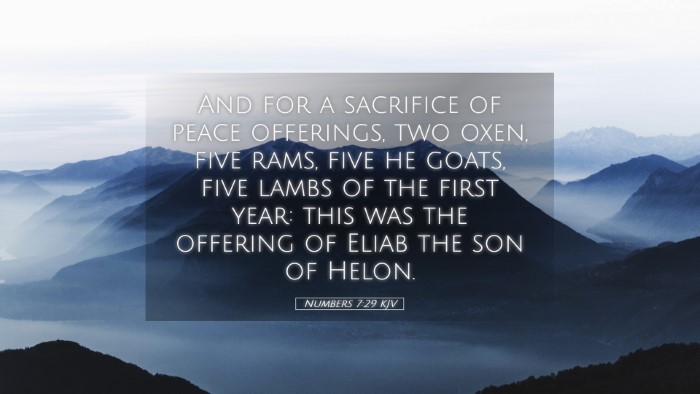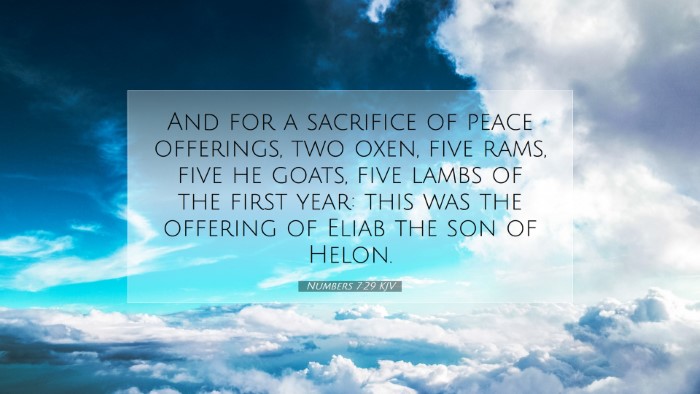Numbers 7:29 - Commentary and Insights
Verse Reference: Numbers 7:29 - "And when Moses went into the tabernacle of the congregation to speak with him, then he heard the voice of one speaking unto him from off the mercy seat that was upon the ark of the testimony, from between the two cherubims: and he spake unto him."
Introduction
This verse encapsulates a profound moment in the history of Israel's relationship with God, illustrating the divine communication and presence that became central to the Israelites' identity. This commentary will explore the various theological implications, historical context, and spiritual insights derived from this passage, drawing from the works of noted commentators such as Matthew Henry, Albert Barnes, and Adam Clarke.
Understanding the Context
In the book of Numbers, the Israelites are journeying through the wilderness under Moses' leadership, following their exodus from Egypt. The tabernacle represents God's dwelling among His people, and it serves as the focal point for worship and divine communication. As we delve into this passage, it is vital to understand the significance of Moses' role as a mediator between God and the Israelites.
Moses as a Mediator
Moses’ unique status as a prophet and leader:
- He was chosen by God to lead and represent the people.
- His access to the presence of God symbolized the relationship that the Israelites were to have with their Creator.
The Significance of the Tabernacle
The tabernacle, particularly the mercy seat, is a powerful symbol of God’s presence. The commentaries reflect on the following aspects:
The Mercy Seat and Divine Communication
Henry notes that: "The mercy seat was the throne of grace, emphasizing the grace of God in His dealings with His people." It was here that God would communicate with Moses, signifying a direct line of communication that is profound and intimate.
Albert Barnes' Perspective
Barnes elaborates on this communication: "The voice came from between the cherubim as an indication of God's glory and the divine affirmation of His covenant with Israel." The imagery represents both majesty and intimacy; God is transcendent yet accessible.
Theological Implications
This verse has rich theological layers worthy of exploration:
Divine Presence
Clarke emphasizes: "The fact that God spoke from the mercy seat signifies His desire to dwell among His people and communicate with them." This illustrates that God, while wholly other, desires relationship and dialogue with humanity.
The Role of Worship
Worship as a response: The act of Moses entering the tabernacle to hear God's voice represents worship as a response to divine revelation. It prompts believers to consider their own practices of worship and the importance of seeking God’s voice in their lives.
Practical Application for Believers
From this passage, several lessons can be applied to the lives of contemporary believers:
Listening for God's Voice
Matthew Henry points out: "Moses went in, indicating an active pursuit of God's presence." This encourages believers to actively seek God, implying that divine communication requires intentionality.
The Nature of Divine Communication
Barnes highlights: "God’s voice speaks in various ways—the Scriptures, prayer, and through the Holy Spirit." This encourages believers to remain open and attentive to the multitude of ways God communicates His will.
Additionally, Clarke asserts: "As we study the Word, we must approach it with the expectation of hearing from God, just as Moses did at the mercy seat."
Conclusion
Numbers 7:29 is a reminder of the profound relationship established between God and His people. It speaks to the intimate nature of divine communication and the importance of being attentive to God's presence. The insights derived from the commentaries invite believers to reflect on their own interactions with God, encouraging a lifestyle marked by worship, prayer, and openness to divine guidance.
As pastors, students, theologians, and scholars continue to engage with this rich text, may they find renewed inspiration in their spiritual journeys and the understanding that God desires to communicate with His people just as He did with Moses.


